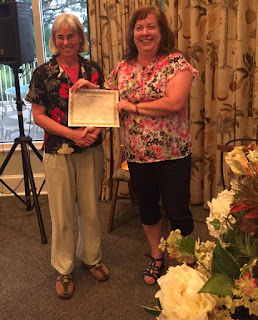 First, I’d like to say how extremely appreciative and honored I am to have won first place for my novel submission at the SWA Southeastern Writers Workshop in June of this year. Honored and terribly surprised. Blown away might be more accurate. In my jubilance, I’m sure I was the loudest recipient in the history of the conference.
First, I’d like to say how extremely appreciative and honored I am to have won first place for my novel submission at the SWA Southeastern Writers Workshop in June of this year. Honored and terribly surprised. Blown away might be more accurate. In my jubilance, I’m sure I was the loudest recipient in the history of the conference.
I had to force myself to enter the contest. You know how that is, right? Dipping your toe in the water and actually accepting the challenge of sinking or swimming, whether for a short story or a longer manuscript, is just plain scary. Scary and risky. Scary because you have to put yourself out there, and risky because somewhere way in the back of your creative writer’s mind is that little voice that says, “why bother and don’t do it. Somebody might not like what I write.”
People, we have to go for it anyway. You have to close your eyes, hold your nose, and jump in with both feet. When you do, try these suggestions to make swimming in that deep pond a little easier and possibly successful. You just might end up floating on top of that water.
1. READ AND FOLLOW THE GUIDELINES. Down to the very last detail. These are the rules and regulations, word count, correct font and formatting, number of pages, everything the contest wants you to do including how to send your work and where and to whom to send it. Make sure you know your deadlines. Contests organizers do not waiver on deadlines.
2. READ THE GUIDELINES AGAIN. I write them down on a tablet in my own words, and make them handy during my process. I read somewhere that half of the submissions for contests are rejected right off the bat merely because people do not follow directions for the specific requirements and guidelines. That’s not a good reason for a rejection.
3. SUBMIT A FLAWLESS ENTRY. If there are no specifics or requirements for formatting your work, I would suggest checking out the Formatting & Submitting Your Manuscript by Chuck Sambuchino and the Editors of Writer’s Digest Books. The book’s standards make it easy to submit a flawless entry.
4. DON’T RUSH. Take your time with a new piece, or re-vamp an older work and make it better; make it the best. Allow yourself plenty of time for editing and re-writes. Then read it aloud and edit it again. The more the merrier. Me, I’m a compulsive re-doer. I have to make myself to stop and hit the SEND button.
5. WRITE FROM YOUR HEART NOT WITH THE AIM OF WINNING. Think about the fact that someone is going to read your work. To me, that is the coolest thing. Then you have no choice but to write your best work. You will submit your very best work.
Good luck to all who take the risk!
Jody Herpin, a southern writer, mother, Grams, watercolor painter, and lover of life, lives in Kennesaw, Georgia, with her husband, Mike Boggioni, and their Mini-Aussie, Bella. In June 2015, Jody won First Place for Novel Submission for her first novel, Weather Permitting, at the SWA Southeastern Writers Workshop. Catch her blog at www.jodyherpin.wordpress.com and like her at www.facebook.com/authorjodyherpin.














